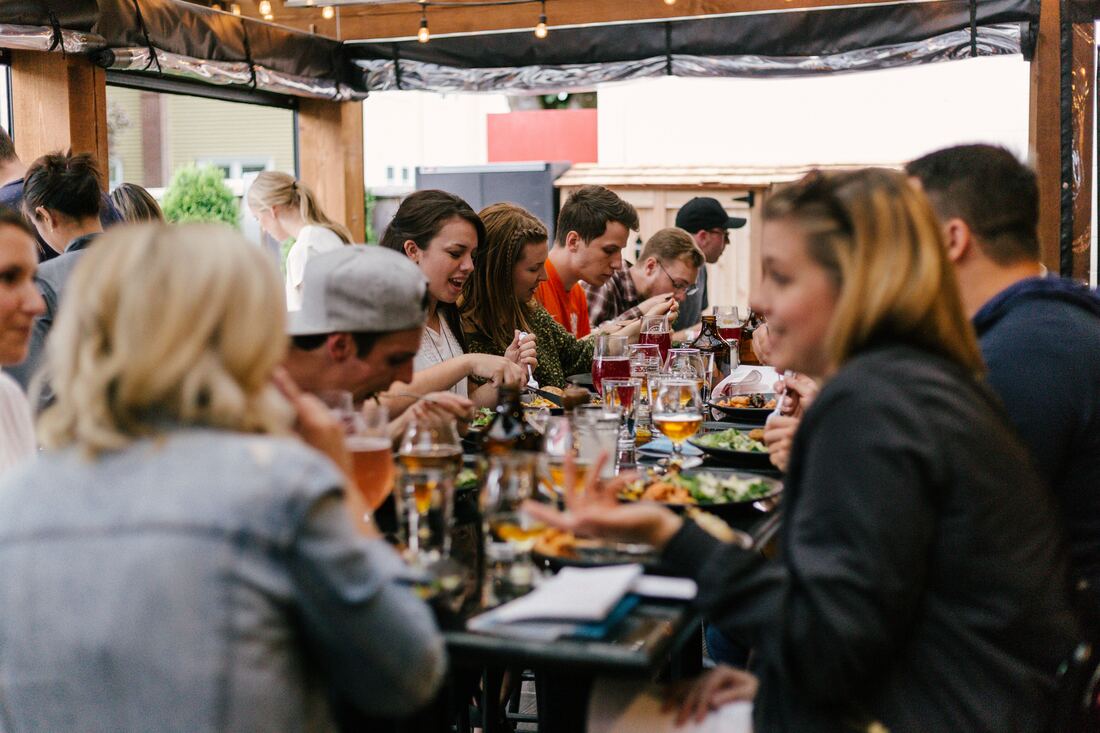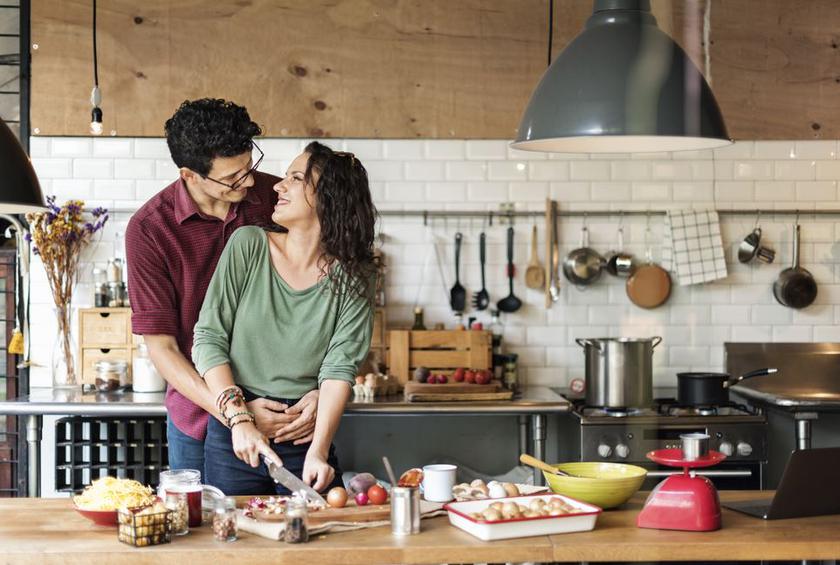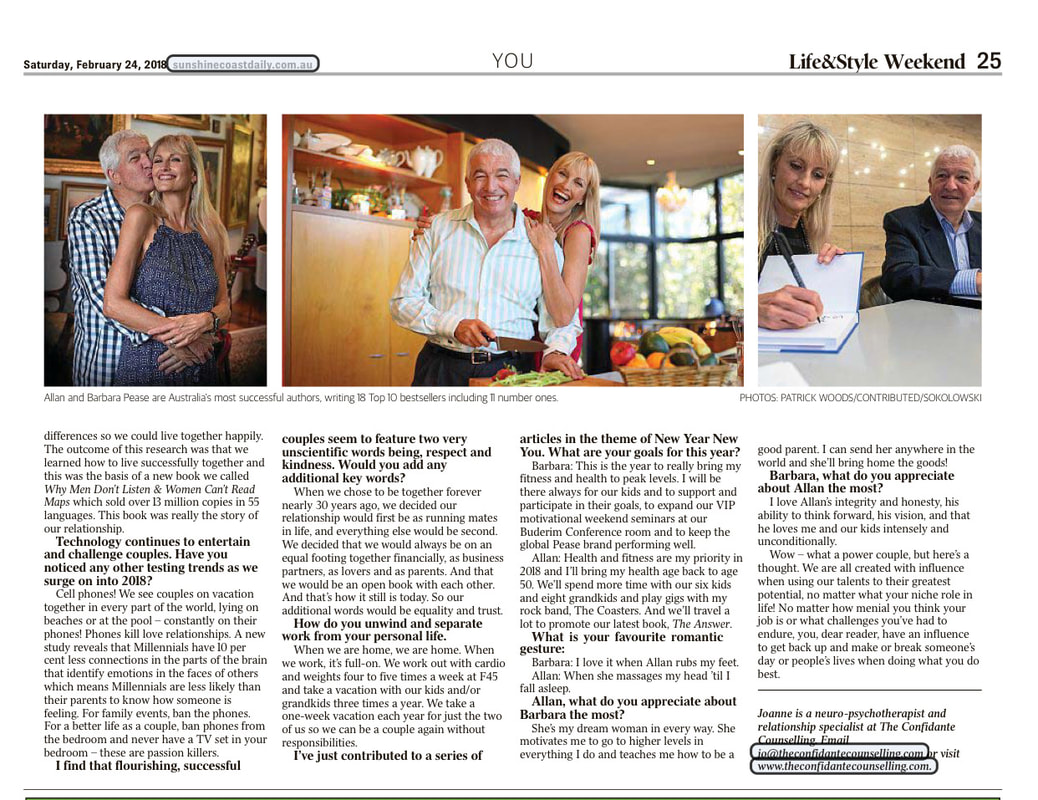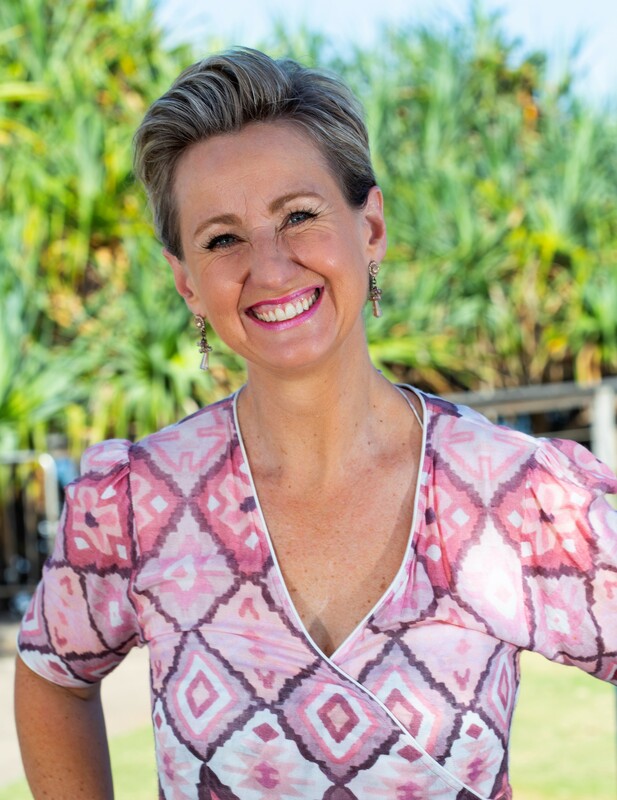|
With much grunt and gusto, I’ve bravely explored the world of the hairy man type in a relationship with a fluttering eyelashes female throughout August. I’ve delved into these key topics often found in my relationship therapy and as put forward throughout this series by blokes. They’re yearning to discover why women:
You can find these answers and more on my blog, however as today August draws to a close, it’s time for the big question many fellas want to get to the bottom of: Why don’t women desire sexual intimacy as much as we do? In the absence of a sealed section in this magazine, I’ll keep it above the waist line. Once again, I’ll highlight it’s just not appropriate to stereotype men and women. There is a large quotient of libidinous females out there that suffer inextricably from rejection and low self-esteem as result of not being with a man who fits the mainstream oversexed male. You know the typical beef-cakes who chuckle and elbow each other at the great aussie barbecue as they whine they’re never indulged enough by their Sheila. This role does not always play out at home in the bedroom so that’s a topic for another time. After collaborating and interviewing a few sex therapists, including the work of Laurie Watson of Psychology Today, here's what I've unveiled:
Women long for an emotional connection before physical connection and it’s worth realising they may need that first to be emotionally vulnerable and available to communicate. That is, unless they pass out snoring first. Listen in to my interview with Sunshine Coast sex therapist, Pauline Ryeland on my "Is This Love?" podcast! Joanne Wilson is a neuropsychotherapist, relationship specialist, radio co-host, workshop facilitator and guest speaker. Contact www.theconfidantecounselling.com or via email. Can you imagine how fun this series is in attempting to walk in the shoes of a bloke for a month? It sure is mind boggling when you can’t see as many shades of colour, talk half as much, struggle to put feelings into words and often incredibly frustrated when your woman doesn’t seem to want to put out as much as you’d like her to. I do hope however, you’ve benefitted from this series in realising our uniqueness. These stereotypical behaviours do not apply to everyone – you are you! Some women display more masculine behaviours than others and vice versa. Meanwhile in the counselling room and as put forward on my social media, there certainly are some recurrent themes. Today, I contemplate, “Why do women always interpret the worst of what men are trying to say and not just assume the best one?” “Trying to say” is the important phrase here. I can’t count the number of times brave blokes have turned up for counselling rather ill-equipped to reveal what’s really going on for them and even worse, attempt to talk about the “f” word – feelings. I do wonder how much socialisation has created this stoicism and repression of feelings that contribute to men leaving the “relationship stuff” to the women. Men are not the “feelingless” gender – they’re in there. If many Australian blokes haven’t traditionally been encouraged to speak about matters of the heart coupled with their brain that tends to internalise, why would they expressively reveal their emotions to openly communicate the way women want and create that connection we all long for in our relationships. We absolutely need to appreciate the differences in the emotional centre of our brains. Women have a stronger left amygdala that facilitates recall of emotional experiences in more detail. Men are stronger on the right side, providing them to focus on the big picture in a more practical and orderly way versus the emotional memories. Guys are fortunate to have a slightly smaller prefrontal cortex which allows them to get to the point a lot quicker with reason and logic. A woman’s amygdala is more easily activated by emotions compared to their man’s action-orientated and practical approach more alert to danger and wired for protecting. You threaten them and then they’ll exhibit more emotion! This practical, external focus explains why he always wants to fix it without the need for long talks into the night as we may go in circles with no apparent point. Simply put, his brain circuits aren’t wired to retain information in the detailed and emotional way that a woman’s is. How on earth are they then expected to communicate in the same way we do? It’s also worth noting if based on previous experience, do: - some women could already have labelled their man with certain traits that then filter in the worst-case scenario? - we also incorporate “catastrophic” thinking into our relationships that then translates to lack of trust and looking for the negative in all situations? - we attempt to mind-read in making weird and wonderful assumptions instead of giving them the benefit of the doubt? - we allow comparison to steal the joy from hearing the positives in our man’s communication as compared to what we hear other men say to their partner? Do we assume all other men say all the right things and forget the positive traits and words he does get right in a different way? I whole-heartedly agree that many men could share the “relationship load” in facilitating emotional attentiveness. Could same ladies, however remove any high expectations and the “shoulds”. Could we shift the blame to a more collaborative approach in enjoying your incredible differences in how we communicate and play the catch them doing it well game for a change? Next week, the most common question: Why don’t women desire sexual intimacy as much as we do? Joanne Wilson is a neuropsychotherapist, relationship specialist, radio co-host, workshop facilitator, guest speaker and weekly columnist for the Sunshine Coast Daily. Contact Jo at www.theconfidantecounselling.com or via email. Listen in to her podcast discussing these articles and more, "Is This Love?"  This week, I’m supporting blokes for when she sees “puce” and you see brown. She sees “steel slate” and you see gray. We are in the middle of Audacious August with my attempt at stepping into the boots of the great Australian male in relationship with his sheila! Feel free to peruse my blog for the recent weeks articles on the myriad of challenges faced by men as noted in relationship counselling or you’ve emailed and commented on social media. This topic represents a metaphor for male female relationships in that we really do see through different lenses in many instances. Realising this masculine versus feminine approach could be one major step forward to your more intimate relationship. Thanks to Jason who commented on social media about his frustration on being questioned by his woman about interior decorating colour options. He noted, “We only see in primary colours”, and he’s quite right! Men do see multiple distinct colours only and females see multiple shades. It’s hard-wired. As you could imagine, women become quite despondent and rejected when we receive little input to our dilemma of the mango tango curtains versus the coral ones. Thanks to Dr Caroline Leaf in her book, He Said She Said, who provides greater insight around the cause of this in the biology around our vision! “The X-chromosome provides the cone-shaped cells that handle colour. Women have two X-chromosomes and men have one, so women have more cells that allow them to see subtle changes in shades of colour. Females also have more P-cells—special cells in the retina that help the brain interpret texture and colour. These P-cells allow women to be more detail-oriented than men. Males, on the other hand, have more M-cells, other specialized cells in the retina that help the brain analyze motion, action and direction. M-cells help men see how things move and work.” This would explain why I’ve managed to reverse into my husband’s car in our driveway let’s just say more than once in broad daylight. It also makes sense why he couldn’t care less about what shade of red he went when he found out. Surely the fact that men see better than women in bright light and women see more details in short distances in the dark has something to do with it? So fellas, email me your burning questions for support during Audacious August. Bewildered ladies, feel free to forward any contemplations you find unsettling for this series too! You can remain anonymous! Joanne Wilson is a neuropsychotherapist, relationship specialist, radio co-host, workshop facilitator, guest speaker and weekly columnist for the Sunshine Coast Daily. Contact Jo at www.theconfidantecounselling.com or via email. Listen in to her podcast discussing these articles and more, "Is This Love?"  Throughout Audacious August, I’m bravely journeying the world of an aussie male. Peruse the most recent articles on this blog for some of the mysteries I seek to unveil about men, particularly those in relationship with a woman. Today I investigate why we find men’s lack of communication so troubling? Thank you for your overwhelming response to last week’s article. Here are more contemplations based on your contributions, Why:
Firstly, let’s point out the amazing similarity between men and women - we all long to be loved! Yes, we might look different, sound different and go about getting love in a different way however all the PHd’ers out there keep coming back to more similarities than differences. Whilst I’ve covered fascinating facts about our variances in brain structure over previous articles, one important point is we are miraculously designed to complement each other. When you think about it, there isn’t one kind of man and one kind female – most of the stereotypes just don’t fit! You are unique. I’ll now address the talking conundrum with a joke from the late American journalist, Helen Rowland, "Before marriage, a man declares that he would lay down his life to serve you; after marriage, he won't even lay down his newspaper to talk to you." I mentioned last week that constructive emotional disclosure discussions support closeness. I get the impression that aside from the closeness part, this seems most unappealing to men. One helpful male wrote in this week with this helpful perspective, “The masculine in all of us, men and women is covert by nature and thus reluctant to open itself up to scrutiny. Many men, especially those who have yet to recognise the power of their own feminine essence, simply have not exercised this channel for connection with another human being.” Furthermore, neuroscience reveals that females are extremely accomplished at detecting when they’re being listened to – or not. It influences our sense of self-worth. We will catch you out! Female brains have an amazing capacity to group sounds and analyse them versus the male brain which listens for a specific focussed purpose. Here’s an exert from Dr Caroline Leaf’s book, “He said, she said”. “A husband may find it a challenge to keep up with his wife as she zig-zags her way through all the various adventures of her day, constantly inserting random factoids and minutiae. There’s a reason she knows where she’s going even when he’s completely lost and beginning to lose interest. Her girlfriends love all the extra details she gives when she’s telling a story—her husband’s wondering, “What does this have to do with that?” As I regularly highlight in couple’s therapy, ladies, save some of your words for your gal pals and reduce any extravagant body movements to minimise distraction! Fellas, hang in there with us. Keep eye-contact, reassure, ask questions and practise attentive listening for as long as you can. Start pondering the footy scores or other bouncy things – we see it all over your face! Next week I’m supporting blokes for when she sees “puce” and you see brown. She sees “relaxed khaki” and you see green. So fellas, email me your burning questions for support during Audacious August. Bewildered ladies, feel free to forward any contemplations you find unsettling for this series too! You can remain anonymous! Joanne Wilson is a neuropsychotherapist, relationship specialist, radio co-host, workshop facilitator and guest speaker. Contact www.theconfidantecounselling.com or via email. Look out for my new podcast discussing these articles and more, "Is This Love?" With much excitement, I’ve renamed this month - Audacious August. What daring and courageous risks would this thrill-seeking columnist be taking now you ponder? You guessed it, I’m precariously peering life through the lens of the other side. I’m bravely entering the foreign world of being an Australian manly man! Furthermore, being a macho beefcake navigating love and relationships.
I feel it’s time to support you blokes in areas such as understanding every word we are NOT saying as well as a few expert tips on getting all the love you need. Yes, I do know what your version of love is! Wink. As a woman and relationship therapist, I’ve heard all the snide jokes. Here’s one: “Menopause, menstrual cramps, mental illness, mental breakdowns…ever notice that all of your problems begin with men?”. What about, “While creating men, God promised women that a good and ideal man would be found in all corners of the world, then He made the earth round.” I’ll leave it at just the two but leave you with a few questions about men that are continually investigated in the counselling room: Why:
Whilst I agree we can’t stereotype the idiosyncrasies and mysteries of the Australian male, these are consistent themes I notice. Just to clarify, some fellas talk even more than their shy sheila and absolutely do some women have a higher libido than their stallion. We already know that intimacy in relationships is fostered in deep sharing and empathic responding which makes sense where it all goes wrong. If you take nothing else from this series, what is for sure is that women feel more intimate when their partners display understanding, validation, and caring. What’s fascinating for me is that men thrive on protecting and achieving all these things however as for both sexes, don’t always get it right. I can’t wait to delve into all these challenges of being an Aussie man in relationship for the well-being of all throughout Audacious August and beyond! So fellas, email me your burning questions for support during Audacious August. Bewildered ladies, feel free to forward any contemplations you find unsettling for this series too! You will remain anonymous! Joanne Wilson is a neuropsychotherapist, relationship specialist, radio co-host, workshop facilitator and guest speaker. Contact www.theconfidantecounselling.com or via email. Look out for my new podcast discussing these articles and more, "Is This Love?" Food, glorious food! It’s the Noosa Food and Wine Festival next week and I’ll be there with bells on! The festival will play host to over 200 chefs, producers, winemakers and journalists with a passion for gourmet food and wine. We will be able to taste unique ingredients, watch demonstrations by leading chefs and take part in beach BBQ’s and the festival’s annual beach party. Bring it on, let’s UTF – Unite Through Food.
It got me thinking! Food is one of the wonderful necessities of life. We eat throughout our marriage and relationships and well, every part of our lives. Does Australian culture use this shared experience to strengthen our relationships, say like the Italians? You may well have done the exciting and romantic dates in the early days at your favourite restaurants or on the beach as you gazed hopefully and lovingly into each other’s eyes. What about the every-day upkeep of our relationships? Some of the best conversations you’ll have will be over a meal. It’s universally acknowledged as a great time to discuss a variety of topics, even difficult ones. Don’t underestimate the psychological and emotional benefits, namely social connection, intellectual stimulation, relaxation and romance. Here’s my top tips for curating culinary cohesion for couples: Give up multi-tasking. Hands up who eats in front of the TV or accompanied by a screen? Thought so. The trap of living under an unnecessary sense of urgency to be entertained, work and of course be ever present on social media can put you in chronic toxic stress and make you sick, including terrible indigestion! Turn off the screens and allow meals to be the perfect time to talk about your highs and lows. It will also slow you down and eat less. Invest the time in home cooking. Savour the satisfaction of creating a dish and likewise having your partner prepare something for you is something you can put loving care and effort into. (Hello husband, I hope you’re reading.) Sure, it’s still a meal, but when it’s made with love, it’s super special and tastes oh so much better! It’s like a tiny, tasty gift at the end of a long day. Can’t cook? Try learning. This is the perfect joint activity. There are awesome options to do this together here on the Sunshine Coast. Putting in the effort to improve yourself for the sake of your relationship shows a great deal of love and dedication. Create the mood: Arty and bright or warm and dark tonight? Use those funky little string lights, draw something, use aromatic candles and swoon to the music. Want to feel sophisticated? Throw on some classical. Tweak the atmosphere in your house and bang - date night is on. Relax and enjoy yourselves! Just because you switched off technology doesn’t mean you need to be super formal. Sit back, relax and chill. Why not kick back on the floor whilst eating for a change? If there are little munchkins in the house, they’ll love a snackable spread on a blanket. Plenty of other cultures do it. Make it habitual: It’s all wonderful to now decide to “eat together more often.” Why not hand write a specific goal, ie “Eat together as a family at the table three times per week on a Tuesday…”. Paste this up on the fridge for ALL to see and practice, practice, practice. Keep each other accountable and after 30 days, it’ll be the start of the norm of UTF for you! Just another heads up for your calendar! There’s the inaugural The Curated Plate culinary festival between 8-11 August so head online to grab your tickets. See you on Noosa beach next weekend! I’ll be the one with the empty plate. Joanne Wilson is the weekly columnist for the Sunshine Coast Daily Weekend magazine, weekly radio guest on Salt106.5, professional relationship counsellor and certified neuropsychotherapy practitioner of TheConfidante Counselling. She is based on the Sunshine Coast, Queensland - Australia. You can contact her at: www.theconfidantecounselling.com or email HERE. You’re sick of fighting. It’s a never-ending merry-go-round of ‘He-said’, ‘She said’, ‘You did this’ and ‘No, I didn’t.’ Sound familiar? If it does, it might be time to work on your ability to forgive.
Do you ever wonder why some people who yet having experienced incredible adversity, come out the other end joyful and kind? It seems one key difference in these individuals is forgiveness. Whether they chose to forgive themselves or their perpetrators had a great deal to do with what followed in their lives. Those that choose anger and hold their grudges seem bitter and tortured their whole lives. The decision not to forgive can be toxic – both to yourself and to your relationship. I recently wrote about coping with your partner’s family and friends and this is often an area where you’re challenged to forgive freely. I am fascinated by the numerous studies that have shown that we when don’t forgive and revisit our memories of the supposed wrongdoing, a fear response is produced in our amygdala (the part of our brain responsible for our emotions). This response causes a release of stress hormones which increases our heart rate and blood pressure. If we keep holding on to our betrayals and anger, this response remains active, putting us at risk of developing stress-related illness both mentally and physically. Unforgiveness keeps us awake at night and keeps the perceived wrong-doer living rent-free in our head for far too long. Forgiving is not easy. Just like any other difficult or new task, you need to learn how to do it with repetition and consistency. For the sake of your own emotional well- being, as well as that of your partner - it’s worth it. If you struggle to forgive, these five tips may help: 1. Slow it down Ensure you are not in a heightened emotional state. Allow 20 minutes to slow your heart rate down then ask yourself these questions to provide a clearer perspective: ‘How is he/she feeling right now?’, ‘Are they justified in their actions?’, and ‘What is my part in this?’ Putting yourself in someone else’s shoes is no easy task - especially when it comes to your spouse. 2. Switch Off the Nasty Voice We all have an inner voice, and sometimes it doesn’t play nicely. When we fight, its critical nature comes to the fore, spewing forth things like ‘He’s trying to manipulate you.’ or ‘She’s twisting your words again.’ or ‘Just ignore him. You’ll feel better that way.’ All of this is counter-productive to forgiveness. In the heat of emotion, replacing these with kind and respectful self-talk is paramount to moving forward and playing fairly. 3. It’s a choice Rather than holding on to all the little things your partner has done, (and I know you know what I mean – that vast catalogue of their wrongdoings stored in your brain!) you must learn to choose to leave it behind you. You will have conflict, that is human nature. Don’t hold onto the upsets. Work through the current issue through listening and validating and grow together from it. 4. Ditch the Baggage Like it or not, your childhood and parent/carer relationship role models play a big part in the relationship you have with your partner. Perhaps you had a parent who used silence to let you know they were angry. Consequently, each time your partner is quiet, you find yourself wondering ‘What have I done?’. Your partner may just be tired and having a quiet moment. Work out where your fear stems from, put it into context and evaluate your behaviour from this logical, rational standpoint. 5. Who will win? When you’re in the thick of an argument, it’s very hard to ‘see the forest for the trees’. You lose track of the goal of being on the side same (a tenet of any good partnership) because you’re so concerned with winning. But for you to win, your partner needs to lose. Is this the outcome you truly want? Set the example on the goal of cooperation and commitment to flexing your forgiveness muscle and watch your relationship pump with synergy! Joanne Wilson is the weekly columnist for the Sunshine Coast Daily Weekend magazine, weekly radio guest, professional relationship counsellor and certified neuropsychotherapy practitioner of TheConfidante Counselling. She is based on the Sunshine Coast, Queensland - Australia. You can contact her at: www.theconfidantecounselling.com or email HERE. We’re up to the final part of my Intentional Relationship series where I’m offering great tips to “level up” your relationship. So far we’ve covered:
Today we’re focussing on how we can become “Masters” versus the dreaded “Disasters” in our relationship? This term refers to Dr’s Gottman’s research involved analysing married couples over the space of six years. They found those still happily together at the six-year mark “turned toward” each other 87% of the time. These couples were called the “Masters”. By contrast, the couples that had fallen apart — labelled, very bluntly, “Disasters”, only managed to turn towards and connect three times out of 10. How can we strive to “turn toward” our partners more often to given them as much engagement and attention we’re capable of? 1. LOOK FOR THE POSITIVES: “Masters” view their environment, and their partners more appreciatively. They create an air of respect and gratitude for one another making it easier to engage with their bids for attention. 2. DISAGREE RESPECTFULLY: “Disaster” couples look at their lives and partners negatively. They get hung up on any failing, no matter how inconsequential. Couples that find themselves tearing at each other disrespectfully are on an express elevator to separation. If you need to express it, consider your delivery and use your feelings words to convey the impact of their behaviour. 3. UNDERSTAND WHY YOU ARGUE: Many arguments stem from a sense of disconnection. It is not about the dishwasher or toilet seat. It is about whether the other person has your back. Underneath we can fear abandonment. Fear turns to anger and we lash out at the person we’re terrified of living without. When you understand how insidious this fear of disconnection truly is, it’s easier to put the effort into those “bids” for connection. 4. ENJOY INDIVIDUALITY: You and your partner are not clones! For all your similarities, you have different tastes and interests. Let your partner know how much something means to you. They don’t need to necessarily partake in everything with you but know that it is meaningful. 5. BE KIND: If your partner is down in the dumps and you’re tired and laid out on the couch, it can be the greatest gift in the world to get up and hold them tight. It’s these small gestures, these small expressions of kindness and compassion, that exemplify turning towards your partner when they need it. Understanding the magnitude of acknowledging “bids”, builds a stronger relationship that inevitably turns everything else ON as well! Joanne Wilson is the weekly columnist for the Sunshine Coast Daily Weekend magazine, weekly radio guest on Salt106.5, professional relationship counsellor and certified neuropsychotherapy practitioner of TheConfidante Counselling. She is based on the Sunshine Coast, Queensland - Australia. You can contact her at: www.theconfidantecounselling.com or email HERE.  Welcome to Part Three of my “Intentional Relationships Series” where you’re getting thought provoking ideas on how to “level it up” for that thriving and dynamic relationship. It would be true to say the meaning of “turning on” your partner is fairly clear. As it turns out, "turning toward" your partner is a considerably important priority for connection. If you make a conscious effort to consistently turn towards your partner, it's likely you get to enjoy both! In recent weeks, I’ve outlined, Seeking and allowing individuality and then Are you holding back in your relationship? Today, I’m all about turning toward your partner. In any relationship we seek emotional connection from our partners. These take the form of distinct “bids”, as outlined by scholar, Dr John Gottman. These bids are related to safety derived from attention, conversation, approval, sympathy, and play etc. Consider, “Can you help me find my other sock?”, “Did you notice that Meghan Markle doesn’t wear panty hose?”, “What did you get up to today?” and the quintessential “Does my bum look big in this?”. They present various attempts at making a connection in the form of interest, reassurance and emotional support. How you respond to this bid can be summarised by one of three ‘turns’. 1. Turn against your partner: When you respond to one of these attempts at connection with hostility. You snap at them and tell them you’re busy or concentrating. You may even tell them to nick off with “Shhhh, Brie Larson is on the tellie!” 2. Turn away from your partner: You ignore or dismiss them! You pretend you haven’t heard, or maybe even give a little shrug to drive your apathy home. This is also a common tactic easily deployed after conflict. 3. Turn toward your partner: Here it is! You actively engage with your partner’s bid for attention. You look at them, respond and ask questions to show interest and empathy. “Yes, your cheesecake is just as good as Sally’s’!” or “Wow, that must have been so embarrassing. What did you do then?”. All interactions between couples have a mixture of these responses depending on life stressors such as health, work and sleep. Turning away, or even against your partner every now and then isn’t going to destroy a relationship. Couples who consistently turn toward each other; however, fare a lot better. Gottman’s research involved analysing married couples over the space of six years. They found those still happily together at the six year mark “turned toward” each other 87% of the time. That’s really high, and still allows you some room for the occasional “Uh huh. Very nice.” These couples were called the “Masters”. By contrast, the couples that had fallen apart — labelled, very bluntly, “Disasters”, only managed to turn towards and connect three times out of 10. Ouch. How can we strive to “turn toward” our partners more often to given them as much engagement and attention we’re capable of? Watch this space next week! Joanne Wilson is the weekly columnist for the Sunshine Coast Daily Weekend magazine, weekly radio guest, professional relationship counsellor and certified neuropsychotherapy practitioner of TheConfidante Counselling. She is based on the Sunshine Coast, Queensland - Australia. You can contact her at: www.theconfidantecounselling.com or email HERE. Welcome to Part Two of my “Intentional Relationships Series” where you’re getting some thought provoking ideas on how to “level it up” for that thriving and dynamic relationship. Last week I covered seeking and allowing individuality in your relationship. This week I’m asking you to check if you need to take down a few bricks from your walls!
Everyone has a history, and sometimes they’re “Horrible Histories”. Sequential life set-backs can leave emotional scars. Disastrous relationship experiences can even make us cynical, pessimistic, and give up entirely on the idea of ever finding love. Every new failure can become a brick in the wall between you and other people. Once that wall is up, one of two things happen: either you refuse to let other people through that wall, or refuse to let yourself out of it. Now you’re withholding love. You try to protect yourself from getting hurt. This is not the best recipe to constructing a delectable relationship. The lack of communication creates assumptions, drama, confusion and a feeling of insecurity. Your cake will flop! You’re now keeping back the one thing a relationship needs to thrive: intimacy. It’s like purposefully leaving out the eggs that binds it all together. 10 Red Flags you might be withholding love 1. You reject feedback and your reflex is to blame your partner. 2. Complimenting your spouse is uncomfortable. 3. Despite knowing their love language, you’re unable to meet their needs. 4. Conflict means you are silent and emotionally unavailable. 5. It’s easier to criticize than to find positives in your partner. 6. Activities such as work, volunteering, social media, internet, books and other friends take priority over quality relationship time. 7. You avoid sex or do not actively participate. 8. Porn has become an addiction as it doesn’t require emotional attentiveness. 9. Authentic feeling words are off topic. 10. You exhibit controlling behaviours around finances. What Can You Do About It? Being truthful and honest with your answers to these questions will help you start to see not just what you’re withholding, but may give some insight into why. • What profound, beautiful and joyful thought have you not shared with your partner? • Can you recall an experience that was so poignant, fantastic, or gratifying that you didn’t know how to talk about it? • When do you feel a little aggravated and critical and what behaviours do you exhibit? • Are you afraid of the response when you sincerely share with vulnerability? • Do you feel the right to assertively ask for what you need in your relationship? • What is your self-talk as a result of soul-destroying words from any previous relationships? • Have your found peace and freedom from forgiving either yourself or others for betrayal, disappointment and grief? You’d be surprised what you can learn and achieve through some serious introspection. Next week: Which is more important: Turning Toward your partner or Turning them on? Joanne Wilson is the weekly columnist for the Sunshine Coast Daily Weekend magazine, weekly radio guest, professional relationship counsellor and certified neuropsychotherapy practitioner of TheConfidante Counselling. She is based on the Sunshine Coast, Queensland - Australia. You can contact her at: www.theconfidantecounselling.com or email HERE. |
Joanne WilsonJoanne will be your Confidante, enabling you to speak freely in complete confidence and serenity. An integrated approach tailored to your specific needs will be utilised.
Categories
All
Archives
October 2023
|
Joanne will be your Confidante, enabling you to speak freely in complete confidence and serenity. An integrated approach tailored to your specific needs will be utilized. Approaches such as Psychobiological Approach to Couple's Therapy (PACT), Cognitive Behavioral Therapy, Solution Focused Therapy and Emotionally Focused Therapy may be incorporated.
Joanne WilsonRelationship Specialist for individuals and Couples online around the world and servicing areas for virtual sessions around Australia and servicing many clients in Queensland including Caloundra, Noosa, Noosaville, Buderim, Mountain Creek, Gympie.
|
Quick links |
|
Queensland - Australia
0409 909 933
www.relationshiprejuvenator.com
|
|
©
2017-2023 The Confidante Counselling . All Rights Reserved
Web Design by Debbie Navarro










 RSS Feed
RSS Feed









